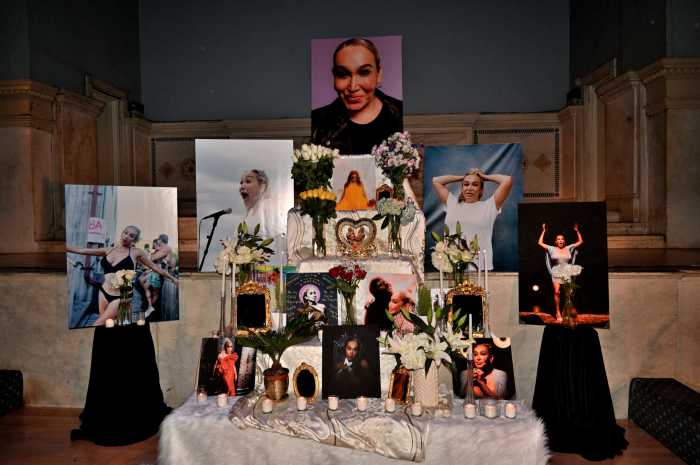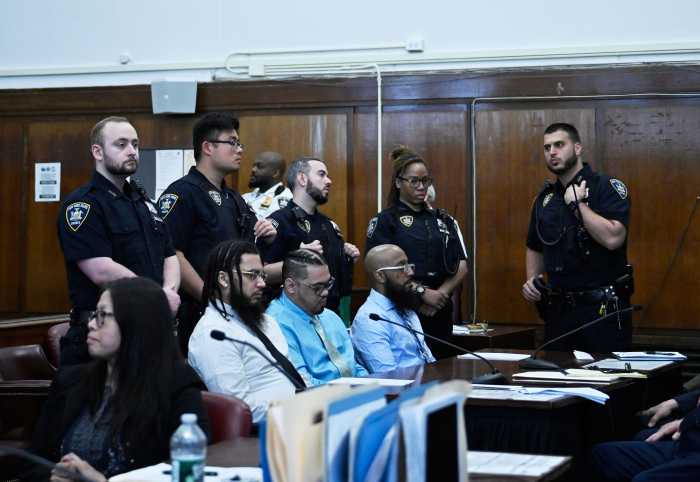BY DUNCAN OSBORNE | In written and oral statements to police, the six defendants in the killing of Anthony Collao denied any involvement in the homicide or accused others of taking Collao’s life on a Queens street last year.
“I am not going down for this,” Luis Tabales, 17, told police, according to criminal court records. “This is bullshit. The two guys that were put in the van with me, the one with blood all over his sneakers and the one with blood all over his pants, were talking about how they put a beating on that kid and I am not going down for that.”
Court records suggest that at least five witnesses identified Tabales and at least one of those five knew him.
The six young men ranging in age from 17 to 19 are accused of using anti-gay slurs as they allegedly beat Collao to death. Their charges include murder, manslaughter, gang assault, and robbery with some charged as hate crimes. All six have pleaded not guilty.
Collao, 18, was straight. In addition to attacking Collao, the young men are accused of stealing his hat, sneakers, wallet, and jewelry. A second victim in the attack was identified in criminal court records. Police caught the young men within minutes of the crime taking place.
The teens were attending a birthday party in an abandoned Queens home on 90th Street. The party, which was advertised on Facebook some defendants said, was put on by two gay teens and it drew a large crowd.
One of the defendants, Alex Velez, 17, said he got into a fight with Collao inside the house and the dispute continued later outside on the street when, Velez said, Collao assaulted him.
“I got into an altercation with the victim,” said Velez who was identified as the youth with blood on his sneakers. Witnesses identified Velez by his clothes, his photo, and in a show-up where police present him alone to a witness. While Velez said he punched and kicked Collao, he said that he saw Calvin Pietri, 18, hit Collao with a “metal object.” Pietri admitted to kicking and punching Collao, but pointed at Velez.
“I did do something,” Pietri told police. “I deserve to be punished for what I did, but I don’t deserve 25 years for what I did. It was Alex Velez that hit the kid with the pipe.”
Police collected a long metal object at the scene with a fingerprint and a palm print on it from Jonathan Echevarria, 17. Police may have more than one weapon from the crime. Echevarria, one of the arrestees, said he knew Pietri, but denied being at the party.
The Queens district attorney has at least eight witnesses to the crime and they identified the assailants by their clothes, in show-ups, or in photos. Some witnesses said they saw Tabales, Velez, and Nolis Ogando, 19, chase Collao down the street in front of the house and around a corner out of sight.
Ogando gave varying statements to police saying he never reached the party, he arrived after the incident, or he arrived just as the crime began. A witness who identified Ogando knew him for a year.
“Ten officers grabbed me and a couple of kids,” Ogando told police. “I don’t know what reason.”
The sixth youth, Christopher Lozada, 18, was wearing Collao’s baseball cap when he was arrested. He claimed to have found the cap on the street. The blood on his pants was found to be his own, and he said it came from a fall at the party.
The prosecution and defense attorneys will appear in court on July 11 to set a date for pre-trial hearings.
The Collao killing is the second noted recent instance of a heterosexual being mistaken for gay or being attacked by assailants using anti-gay slurs.
In 2008, Keith Phoenix and Hakim Scott mistook José Sucuzhanay and his brother, Romel, for a gay couple when they saw the two men huddling together to stay warm as they walked on a Brooklyn street. Phoenix used a baseball bat to kill José, and Romel was injured. Phoenix and Scott are serving decades-long prison terms.

































